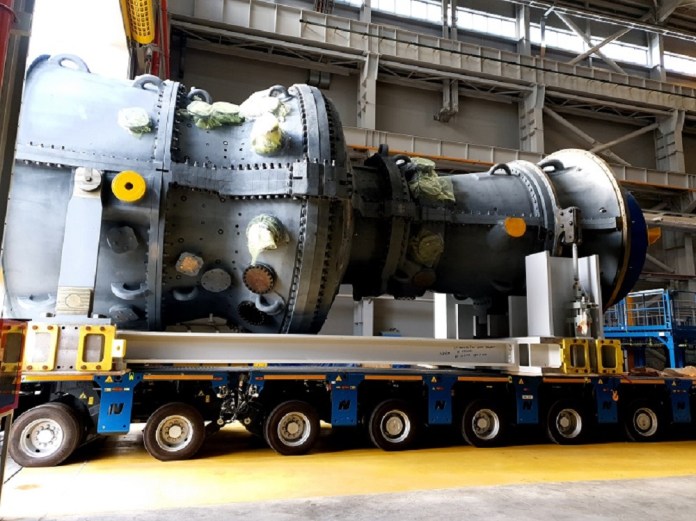Building a First-of-its-Kind Facility in Africa

It all started with what seemed like an impossible dream sometime in 2013: to bring to Algeria’s High Plains city of Batna an advanced manufacturing, assembly, digital, service and repair center for the power generation sector that could be a shining beacon of what was possible not only for the country but also for the African continent.
This dream became a reality with the inauguration of GE Algeria Turbines (GEAT) – a joint venture between Algeria’s electric and gas utility company Sonelgaz and General Electric – which rolled out the first two 9FA gas turbines assembled locally in the country in late 2020, while adhering to high global quality standards and achieving a zero injuries & illness (I&I) rate.
Sonelgaz CEO Chahar Boulakhras encapsulates the vision of the project, “GEAT was and is a strategic project for Algeria for many reasons. First, it allows us to build up the power generation value chain locally. Second, it is a truly magnificent example of what a transfer of know-how and technology can look like. And third, it has demonstrated how industrial policy can contribute to the development of isolated regions in our vast country, paving the way for other projects in the future.”
For GE, GEAT was the natural extension of a decades long commitment to Algeria, most notably, to contribute towards the development of its energy sector. Joseph Anis, President & CEO of GE Gas Power for Europe, Middle East and Africa explains, “At GE, we are used to complex challenges. But GEAT had, right from the start, a special flavor. It had the potential to build up local capabilities and localize complex industrial processes in Algeria. Through GEAT, we are contributing towards further strengthening the country’s energy ecosystem and supporting national socio-economic development goals.”
Samir Bouabba was there right at the beginning of the project, gazing at the vast rocky expanse in the town of Ain Yagout, near Batna in High Plains, watching the wind swept plain in front of him transform into a shining example of technology and skills transfer.
“In 2014, as GE’s Financial Service Leader for North Africa, I was part of a team responsible for setting up the joint venture with Sonelgaz. I immediately understood the potential of this project and requested to be assigned as the CFO of GEAT in 2016, eventually becoming its CEO in 2019.”
But making turbines bloom in the middle of Algeria’s high plains was no mean feat, requiring tremendous perseverance and resilience in the face of numerous obstacles.
Rising to Every Challenge
The first challenge was completing the plant and getting the equipment in place within budget, while maintaining strict international quality, environmental, health and safety parameters. The GEAT facility was finally completed in March 2020, after 2.7 million hours of construction and equipment installation works.
The second challenge was recruiting teams and transferring know-how. This is what Samir Bouabba is most proud of. “The teams that recently assembled the first two gas turbines are 100% locally-recruited. They see themselves as ‘special forces’ that rose up to what once seemed an insurmountable challenge. They have incredible team spirit and pride in what they are doing,” he states. Today, GEAT employs up to 140 Algerian nationals and is expected to create up to another 200 jobs by 2024.
To build the requisite skills, local staff was trained on safety, engineering, manufacturing, leadership, management and various behavioral aspects both at public and private institutes in Algeria, as well as at GE’s facilities in France, India and Hungary, collectively receiving over 30,000 hours of training. Concepts such as “Lean” became the new lingua franca on GEAT’s floors. A system of continuous improvement, the lean methodology helps to identify and reduce waste in processes and increase value for customers. The team also learned the importance of prioritizing safety above all else.
Before the first turbines rolled out, there was however another challenge to overcome – the COVID-19 pandemic. Samir Bouabba and his team at GEAT had a target that they intended to keep – assemble two gas turbines in 2020 that would eventually be installed at the Oumach III power plant at Biskra. However, the pandemic threw a spanner in the works. Activities at the facility had to stop for several months and GE experts who were needed to examine and provide final shop qualification certifications could not fly into the country because of the nationwide shutdown.
“However, we were committed to achieving our target,” recalls Samir. “Once restrictions were eased and we were able to re-open GEAT’s doors, we put in extra hours to complete the units in 2020, while adhering to strict safety protocols to prevent the spread of the coronavirus. We were also in constant touch with the local authorities, so that in the end we were able to receive their assistance to bring in the people necessary to certify the turbines within the right time frame.”
Only the Beginning
GEAT is already manufacturing components such as gas turbine piping and skids, assembling turbines and control systems, and servicing power generation equipment. However, there is a lot more in the works for this first-of-its-kind facility in Africa. “The execution creates the engagement,” is one of Samir Bouabba’s favorite mantras. “There is no doubt that we have reached a major milestone with the rollout of the first two gas turbines but this is only the beginning.”
Seeing the initial successes at GEAT has encouraged the entire team there to keep moving forward and to continue to build new capabilities. “We expect to start creating digital solutions for the power sector by 2021 and to begin providing repair services for GE’s 9FA gas turbines for the first time in Africa by 2024, enabling Algeria’s fleet of over 30 9FA units to be repaired domestically at GEAT. We are changing the perception of what is possible in the country and committed to pushing the frontier of possibilities further,” concludes Samir.










